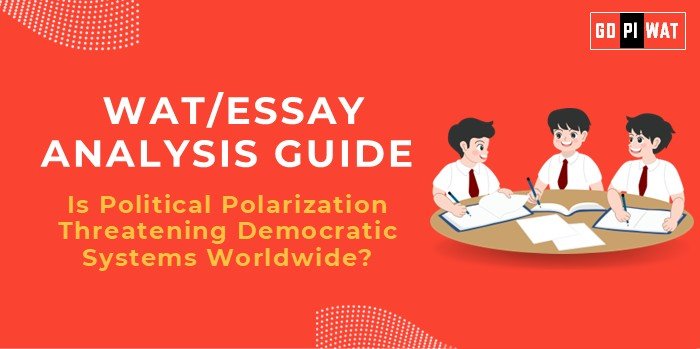📋 WAT/Essay Analysis Guide: Is Political Polarization Threatening Democratic Systems Worldwide?
🌐 Understanding the Topic
Political polarization impacts governance, public trust, and institutional stability, making it a significant concern for democratic systems. Business leaders and policymakers need to address this issue to ensure sustainable governance and societal harmony.
📝 Effective Planning and Writing
- ⏱️ Time Allocation:
- Planning: 5 minutes
- Writing: 20 minutes
- Review: 5 minutes
- 📘 Structure:
- Introduction: 70 words
- Body: 350–375 words
- Conclusion: 70 words
💡 Introduction Techniques for Essays
- ⚖️ Contrast Approach: “While polarization drives political participation, it leads to deadlocks and erosion of democratic norms, as seen in the U.S. Congress’s 2.8% productivity rate in 2023.”
- 📖 Case Study-Based: “The Russian interference in the 2016 U.S. election highlights how polarization can destabilize democracies through external manipulation.”
📚 Structuring the Essay Body
🏆 Achievements
- ✅ Civic Engagement: Polarization has led to higher voter turnout in many democracies.
- 🤝 Germany’s Coalition Model: Demonstrates successful governance despite political diversity.
⚠️ Challenges
- 📉 Legislative Gridlock: U.S. Congress deadlock in 2023 hindered policymaking with only a 2.8% productivity rate.
- 📱 Social Media’s Role: Echo chambers and divisive content amplify political divides.
🔮 Future Outlook
- 🤝 Encourage bipartisan policies to reduce divisions and foster collaboration.
- 📱 Regulate social media algorithms to minimize echo chambers.
- 📘 Invest in civic education to build consensus on shared democratic values.
📄 Concluding Effectively
- ⚖️ Balanced Perspective: “Polarization presents both challenges and opportunities. By fostering dialogue and addressing root causes, democracies can emerge stronger.”
- 🌍 Global Comparison: “Learning from Germany’s coalition model or Norway’s bipartisan approaches offers valuable lessons for mitigating polarization.”
📊 Analyzing Successes and Shortcomings
🌟 Successes
- ✅ Civic engagement has improved in polarized democracies as citizens become more active.
- 💡 Innovative policymaking in coalition systems like Germany ensures diverse representation.
⚠️ Shortcomings
- 📉 Legislative gridlock hinders governance, particularly in highly polarized environments like the U.S.
- 📱 Social media contributes to misinformation and entrenched divisions.
✨ Recommendations for Sustainable Progress
- 📱 Regulate Social Media Platforms: Reduce echo chambers and divisive content through better oversight.
- 🤝 Foster Bipartisan Dialogues: Encourage collaboration across party lines to promote unity.
- 📘 Enhance Civic Education: Build public awareness of shared democratic values and the importance of consensus.
✍️ Sample Short Essays
⚖️ Balanced Perspective:
“While political polarization challenges democracy by creating gridlocks and divisions, it also fosters active participation. Democracies must strengthen their institutions to manage this dynamic.”
💡 Solution-Oriented:
“Regulating social media and fostering bipartisan policies are essential to mitigate polarization and protect democratic systems from further harm.”
🌍 Global Comparison:
“Political polarization undermines democratic norms, but lessons from Germany’s coalition success and Norway’s bipartisan culture can guide sustainable solutions.”


